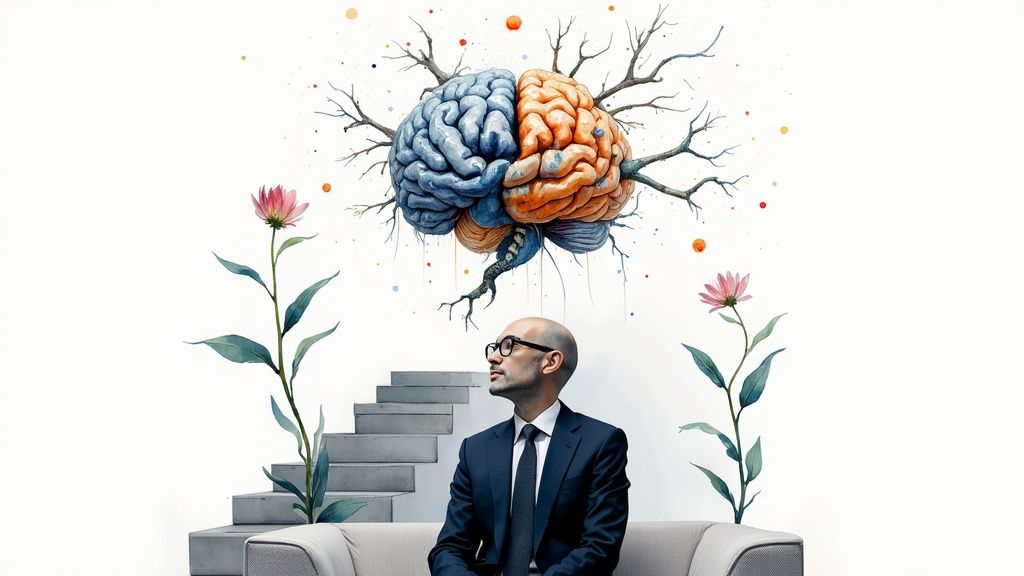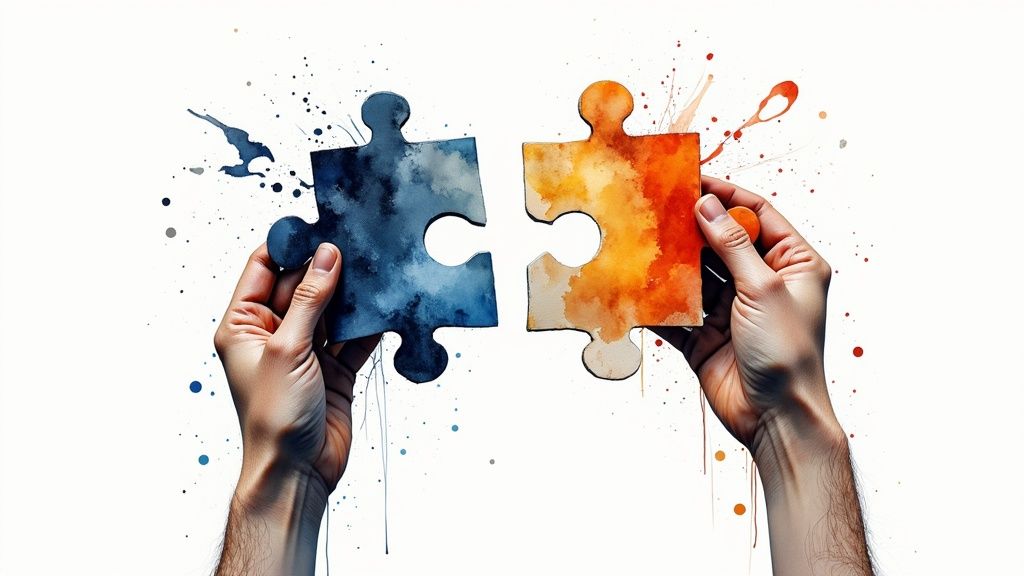
Cultivating a Growth Mindset at Microsoft: A Deep Dive into its Impact and Evolution
Introduction to Growth Mindset

The concept of a growth mindset has become increasingly important in today's business world, and Microsoft serves as a prime example of its application. A growth mindset is essentially the belief that abilities and intelligence are not fixed, but can be developed through effort and dedication. This contrasts with a fixed mindset, which assumes that talents are innate and unchanging. This fundamental belief significantly influences how individuals approach challenges, learn from setbacks, and ultimately reach their full potential. Let's explore the core principles of a growth mindset and how they are integrated into Microsoft's culture.
Embracing the "Learn-it-all" Mentality
At Microsoft, the growth mindset is more than just a popular concept; it's a deeply ingrained philosophy that guides the company's operations. This is reflected in the company’s shift from a "know-it-all" to a "learn-it-all" approach. This means that instead of avoiding challenges for fear of failure, employees are encouraged to embrace them as learning opportunities. For instance, a failed project is not seen as a personal defeat, but rather as a valuable learning experience that informs future endeavors. This creates a culture of continuous improvement, where individuals constantly strive to expand their knowledge and hone their skills. This constant evolution is essential in the dynamic technology sector, allowing Microsoft to stay ahead of the curve and remain a leader in the industry. This emphasis on continuous learning has fostered a unique work environment at Microsoft.
Fostering a Culture of Continuous Development
Microsoft's emphasis on a growth mindset is not just an individual pursuit; it’s a collective effort. The company actively integrates growth mindset principles into team development and performance management. This promotes a collaborative atmosphere where individuals feel comfortable sharing their knowledge and learning from each other. As a result, Microsoft cultivates a workforce that is adaptable, resilient, and prepared for future complexities. By encouraging employees to take ownership of their professional development, Microsoft fosters a culture of lifelong learning that benefits both the individual and the organization. This dedication to growth is a cornerstone of Microsoft's continued success and has significantly impacted its overall business strategy.
Microsoft's Cultural Transformation
Microsoft's commitment to a growth mindset represents a significant cultural shift, especially under Satya Nadella’s leadership. Beginning around 2014, this transformation marked a move away from a culture that equated expertise with having all the answers, toward one that prioritizes continuous learning and development. This was not a superficial rebranding; it was a fundamental change in how the company operates and perceives its potential. This focus on growth has enabled Microsoft to adapt to the rapidly changing tech world and regain its position as an innovator. This evolution has required a significant change in company practices.
From "Know-It-All" to "Learn-It-All"
The heart of Microsoft’s growth mindset lies in the shift from a "know-it-all" to a "learn-it-all" philosophy. This encourages employees to embrace challenges and see setbacks not as failures, but as valuable learning experiences. For example, a technical roadblock is no longer viewed as a sign of incompetence, but as an opportunity to deepen understanding and acquire new skills. This creates an environment where experimentation and innovation flourish, as employees feel empowered to take risks without the fear of punishment for mistakes. This change has resonated throughout the company, leading to a more dynamic and collaborative work environment. The benefits of this shift are evident in the company’s performance.
Integrating Growth Mindset into Company Processes
Microsoft’s commitment to the growth mindset extends beyond words. The company actively embeds these principles into core processes, such as learning and development programs, team dynamics, and performance evaluations. This makes the growth mindset not just an abstract idea, but an integral part of daily operations. By incorporating growth mindset principles into its evaluation systems, Microsoft encourages employees to focus on progress and contribution, rather than simply meeting pre-determined targets. This helps managers better understand an employee’s development path and provide appropriate support.
Microsoft’s performance management system now emphasizes continuous feedback and coaching. This allows employees to regularly assess their progress, identify areas for improvement, and receive guidance from their managers. This creates a culture of open communication and mutual support, where individuals feel comfortable asking for assistance and sharing knowledge. This emphasis on collaboration not only enhances individual performance, but also strengthens the overall knowledge base of the organization. Further illustrating this, the increased participation in optional training programs reflects a culture that prioritizes ongoing learning and self-improvement. This results in a more adaptable and resilient workforce, better prepared to navigate the complexities of today’s business environment. The change also involved adjustments to management training and team interactions.
Impact on Diversity and Inclusion
Significantly, Microsoft's growth mindset culture has also contributed to the company's diversity and inclusion (D&I) efforts. By promoting a culture that values learning and growth, Microsoft fosters a more welcoming and inclusive atmosphere for individuals from various backgrounds. This is because a growth mindset encourages appreciation for different perspectives and experiences, leading to a stronger sense of belonging and mutual respect. The company actively supports allyship and encourages employees to learn from one another, creating a more equitable and collaborative work environment. This, in turn, enriches the exchange of ideas and creates a more innovative workforce. The growth mindset empowers everyone to contribute their best, regardless of background, strengthening Microsoft's commitment to diversity and creating a more dynamic company.
Key Principles in Practice

The growth mindset at Microsoft is not just a theory; it’s woven into the daily fabric of the company. This translates to tangible changes in how teams operate, how performance is measured, and how individuals approach their work. Let's explore how these principles are applied and how they contribute to a more dynamic and innovative environment. These practical applications required changes in management training and team collaboration, highlighting the comprehensive nature of embracing a growth mindset.
Redefining Performance Evaluation
Traditional performance reviews, often focused on fixed metrics and past achievements, can hinder a growth mindset. Microsoft recognized this and implemented a system that prioritizes continuous feedback, coaching, and future-oriented development. Rather than solely evaluating employees against pre-set targets, managers focus on individual progress, adaptability, and contributions to team growth. For example, an employee might be recognized not only for finishing a project, but also for the new skills they learned and the knowledge they shared with their team. This approach fosters a culture that values continuous improvement and collaboration over merely meeting static goals. This focus on development has significantly impacted employee morale and productivity.
Encouraging Risk-Taking and Experimentation
A growth mindset requires a culture that embraces experimentation and sees failures as learning opportunities. Microsoft encourages employees to take calculated risks and explore new possibilities. This means creating a safe environment where individuals feel comfortable suggesting new ideas, trying different approaches, and even making mistakes. This has accelerated the pace of development. This emphasis on innovation also keeps Microsoft at the forefront of technology, continually exploring new possibilities and adapting to the constantly evolving demands of the market. This adaptability is a key driver of the company’s continued success.
Cultivating a "Learn-it-all" Mentality in Teams
The transition from a "know-it-all" to a "learn-it-all" mindset is especially important for teams. Microsoft encourages collaborative environments where individuals feel empowered to share knowledge, ask for help, and learn from each other. This means team members are encouraged to ask questions, challenge assumptions, and provide constructive feedback. This open communication creates a more dynamic and supportive environment. However, a growth mindset isn't just about accumulating information; it's about applying that knowledge to solve problems and drive innovation. This emphasis on continuous learning and collaboration ensures that teams are ready to tackle complex projects and contribute to Microsoft’s success in the competitive technology sector. This collaborative spirit is a hallmark of Microsoft’s culture.
Learning from Failures

The "learn-it-all" mentality naturally leads to a crucial component of Microsoft's growth mindset: learning from failures. This isn't just about accepting mistakes; it's about systematically analyzing setbacks to understand their root causes and extract valuable lessons. This proactive approach builds resilience and drives continuous improvement. This section explores how Microsoft actively encourages this learning process and integrates it into its growth mindset culture.
A Shift in Perspective: From Setback to Stepping Stone
Failure often carries a negative connotation, viewed as a sign of inadequacy. However, Microsoft’s growth mindset reframes failure as a crucial element of learning. Instead of avoiding mistakes, employees are encouraged to see them as growth opportunities. This shift in perspective is crucial for innovation. For instance, a team encountering a technical hurdle during a project is encouraged to analyze the problem, identify contributing factors, and develop solutions to prevent similar issues in the future. This approach transforms setbacks into stepping stones toward greater understanding and expertise. This shift has been instrumental in fostering a more resilient and adaptable workforce.
Practical Application: Integrating Failure Analysis into Processes
Microsoft doesn't just talk about learning from failures; they actively incorporate this principle into their operational processes. This includes post-project reviews, team retrospectives, and individual performance evaluations. This means analyzing failures is not a separate exercise, but an integral part of the workflow. During team meetings, for example, discussing what went wrong is just as important as celebrating successes. Performance evaluations consider not only outcomes, but also the learning process, acknowledging that valuable insights can be gained even from projects that don’t fully achieve their initial goals. This systematic approach ensures that lessons from failures are not lost, but instead contribute to the organization's collective knowledge. This continuous feedback loop is essential for continuous improvement.
Building a Culture of Psychological Safety
A crucial element of a learn-from-failures environment is psychological safety. Microsoft recognizes that individuals must feel comfortable admitting mistakes and taking risks without fear of repercussions. This means building a culture of open communication and constructive feedback. For example, managers are trained to create environments where team members feel safe sharing their challenges and asking for help. This atmosphere of trust encourages experimentation, risk-taking, and learning from experiences, even when those experiences involve setbacks. By prioritizing psychological safety, Microsoft empowers its employees to fully embrace the growth mindset and contribute to a culture of continuous learning and innovation. This sense of safety is foundational to a thriving growth mindset culture.
Employee Development Programs
Following its cultural transformation, Microsoft understood that fostering a growth mindset required more than just a shift in thinking. It needed concrete initiatives and programs to support employee development. This involved rethinking traditional training models and creating opportunities for continuous learning and growth. This focus on employee development is a key element of Microsoft’s growth mindset strategy.
Cultivating Growth Through Targeted Programs
Microsoft invests significantly in programs designed to cultivate a growth mindset. These programs often include workshops, online resources, and mentorship opportunities. They cover a range of areas, from technical skill development to leadership training and communication skills. For example, employees can access customized learning paths tailored to their individual goals and career aspirations. This personalized approach ensures that development efforts are relevant and have a meaningful impact, contributing to both individual and organizational growth. Additionally, Microsoft provides managers with resources to effectively guide and support their teams in embracing a growth mindset. This support is crucial for creating an environment where growth is valued and encouraged at all levels. The availability of these resources reinforces Microsoft’s commitment to its employees' growth.
Integrating Growth Mindset into Performance Management
Performance management at Microsoft has been redesigned to reflect growth mindset principles. This means moving away from traditional, static performance reviews and towards a more dynamic, continuous feedback model. This ongoing feedback loop fosters open communication between managers and employees, focusing on progress, learning, and future development. This shift encourages employees to view performance evaluations not as judgments, but as opportunities for improvement and growth. Furthermore, this promotes a culture where feedback is seen as a tool for learning, not a source of anxiety. Consequently, employees are more likely to embrace challenges and new opportunities, knowing their efforts and progress are valued and supported. This approach has had a positive effect on employee morale and motivation.
Empowering Employees Through Learning Resources
Microsoft recognizes the importance of providing access to diverse learning resources to foster a growth mindset. They offer employees a comprehensive library of online courses, workshops, and learning materials. This empowers employees to take control of their development and pursue opportunities aligned with their goals. The range of topics is extensive, spanning technical skills, business acumen, and personal development. For instance, employees can explore areas like artificial intelligence, cloud computing, or project management, broadening their skillsets and contributing to the company’s overall innovation efforts. This focus on continuous learning cultivates a dynamic workforce capable of adapting to the ever-changing technological landscape and driving Microsoft’s future success. These resources are a testament to Microsoft’s investment in its employees.
Measuring Success

Microsoft’s dedication to the growth mindset goes beyond philosophical discussions and training. To gauge its effectiveness, the company tracks the impact of the growth mindset on its employees and overall business performance. This involves collecting both qualitative and quantitative data through various channels, providing a comprehensive view of the growth mindset's influence. This measurement process is essential for demonstrating the initiative’s value and identifying areas for improvement. This data-driven approach underscores Microsoft's commitment to continuous improvement.
Quantifying the Growth Mindset's Impact
Microsoft uses a multi-faceted approach to measure the impact of its growth mindset initiative. This includes monitoring employee engagement in learning and development programs. For example, the company tracks the number of employees participating in optional courses and workshops, completion rates, and participant feedback. Additionally, dedicated surveys and feedback mechanisms gauge employee perceptions and experiences related to growth mindset principles. These data points help quantify the reach and effectiveness of the company’s efforts, providing valuable insights into how growth mindset principles are being applied within the organization. This quantitative data helps identify trends and patterns related to the growth mindset initiative.
Qualitative Insights: Understanding the Employee Experience
Beyond numbers, Microsoft also seeks qualitative insights into how the growth mindset affects the employee experience. This is gathered through various channels, including feedback sessions between managers and employees, team retrospectives, and focus groups. These discussions provide deeper insights into individual perspectives, revealing how the growth mindset influences their work, interactions, and overall job satisfaction. This qualitative data offers a richer understanding of the growth mindset's impact than numbers alone. For example, these conversations might reveal how a team has become more collaborative and supportive or how individuals have become more resilient in the face of challenges. These personal stories provide valuable context and depth to the quantitative data.
Connecting Growth Mindset to Business Outcomes
Ultimately, the success of Microsoft’s growth mindset initiative is evaluated by its contribution to business results. This means linking the growth mindset to key performance indicators (KPIs) such as innovation, productivity, and employee retention. While measuring these connections can be complex, Microsoft recognizes the importance of demonstrating tangible benefits. This effort shows that the growth mindset is not just a feel-good initiative, but a strategic driver of success. This analysis requires careful examination of data and a deep understanding of the relationship between individual growth and organizational performance. For example, increased participation in innovation challenges or a rise in patent filings could be linked to a stronger growth mindset. Improved employee retention could also be attributed to the more supportive and development-focused environment. By demonstrating a clear connection between the growth mindset and business results, Microsoft strengthens the justification for its ongoing investment in this important cultural initiative. This data-driven approach provides concrete evidence of the growth mindset’s value.
Conclusion
Microsoft's experience with the growth mindset showcases how a cultural shift can dramatically reshape a company. By embracing a "learn-it-all" philosophy, Microsoft has created an environment that values continuous learning, welcomes challenges, and views failures as opportunities. This has not only impacted individual development but has also fostered a more innovative, collaborative, and inclusive workplace. This evolution, while not without its challenges, ultimately reinforces Microsoft's position in the dynamic technology sector.
The Future of Growth at Microsoft
Microsoft's commitment to the growth mindset is an ongoing journey, not a destination. The company continues to refine its approach, integrating growth mindset principles into new initiatives and adapting to its workforce’s evolving needs. This continuous evolution is essential for maintaining a culture of continuous improvement and ensuring the growth mindset remains a core value. This dedication to future development suggests that the growth mindset will continue to shape Microsoft's culture and contribute to its ongoing success. As the tech industry continues its rapid transformation, Microsoft's focus on learning and adaptation will be critical for maintaining its competitive edge.
Beyond Microsoft: Inspiring a Global Mindset
Microsoft’s experience offers valuable lessons for other organizations interested in cultivating a growth mindset. The company’s success highlights that fostering a growth mindset requires a comprehensive strategy encompassing both philosophical shifts and practical implementation through specific programs, performance management systems, and a commitment to psychological safety. This approach, while demanding, offers significant benefits for individuals and organizations. Microsoft’s journey emphasizes the power of the growth mindset to transform not just individual careers but entire company cultures. By sharing its experiences, Microsoft is inspiring a broader conversation about the importance of continuous learning and growth in today's business world.
Want to bring data-driven insights to your innovation process, similar to how Microsoft leverages data for its growth mindset initiatives? Derisky.ai empowers businesses to measure and visualize their innovation impact, derisk through smart experiments, and make informed portfolio decisions. Explore how Derisky.ai can help you achieve significant cost savings and boost your ROI by visiting https://derisky.ai.







